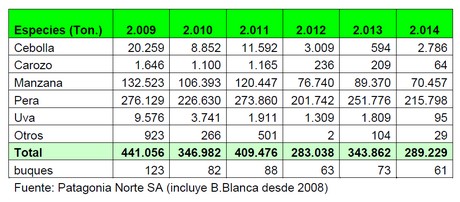In contrast, exports from Argentina, as can be seen in the following graph published by the Department of Pomology of Rio Negro, have been declining in recent years.

So what differentiates both countries?
According to Raul Ferragut, press secretary of the Federation of Fruit Producers or Rio Negro and Neuquen, " Chilean producers have great support from the state and pay much fewer taxes. According to a calculation made not too long ago, they pay U.S. $0.14 cents in taxes for every kilo," he said.
Chile has experienced problems with the size of their fruit because of the frost. Their yields have been of a smaller calibre and this, at first glance, should give competitive advantages to Argentine exporters.
"Theoretically, the smaller size of apples in Chile should have increased interest in Argentina's apple, but we have not noticed it. They can export sizes that wouldn't be profitable for us, we can only export our top calibres, the other sizes won't cover production costs," said Ferragut.
According to him, "profit margins are shrinking because of the overvalued currency."
"The devaluation that took place earlier this year, for which there was much interest, has already been surpassed by the costs we currently have," he said.
Varieties and markets
According to Ferragut, currently, the most attractive markets for Argentina are Brazil and the domestic market, where they can obtain good prices.
The new Red Delicious varieties account for the bulk of Argentina's apple production.
"There was a strong process of conversion to plant mostly Gala and its varieties, as well as some Pink Lady, because we can't get Fuji which are of a good quality due to the weather conditions," he said, adding that "the Granny Smith has been uprooted in many parts of the country and its production is in decline because it's profit margins were not very good. It is very delicate so it's hard to make it arrive in good condition to distant markets, such as northern Europe, where it is mainly exported "
According to Ferragut, "Argentina has a comparative advantage that it's not exploiting. Thanks to the country's agro-climatic characteristics, we use very few agrochemicals for a kilo of fruit. Currently, producers only perform two or three agrochemical applications when they used to make eight some years ago. We have no problems with fungi thanks to the dry climate. We produce the fruit with the least toxic residues in the world," Ferragut said.





